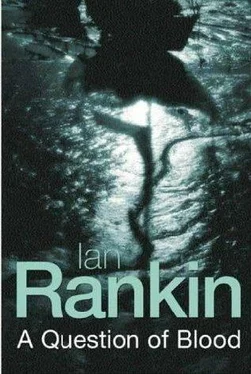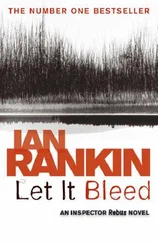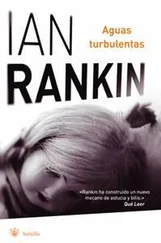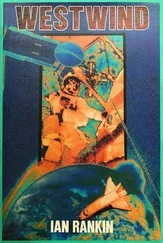Sometime after his arrival in South Queensferry, Herdman had started his boat business, towing water-skiers and such. Siobhan didn’t know how much it cost to buy a speedboat. She’d made a note to this effect, one of dozens listed on the pad back at the table.
“You’re not in a hurry, then,” the barman said. She hadn’t noticed him coming back.
“What?”
He lowered his eyes, directing her to the drinks in front of her.
“Oh, right,” she said, trying for a smile.
“Don’t worry about it. Sometimes a dwam’s the best place to be.”
She nodded, knowing that “dwam” meant dream. She seldom used Scots words; they jarred with her English accent. That she’d never tried altering her accent was testament to its usefulness. It could wind people up, which had proved handy in some interviews. And if people occasionally mistook her for a tourist, well, they sometimes dropped their guard, too.
“I’ve figured out who you are,” the barman was saying now. She studied him. Mid-twenties, tall and broad-shouldered with short black hair and a face that would retain its sculpted cheekbones for a few years yet, booze, diet and cigarettes notwithstanding.
“Impress me,” she said, leaning against the bar.
“At first I took you for a pair of reporters, but you’re not asking any questions.”
“You’ve had a few reporters in, then?” she asked.
He rolled his eyes in reply. “Way you’ve been sifting through that lot,” he said, nodding towards the table, “I’m thinking detectives.”
“Clever lad.”
“He came in here, you know. Lee, I mean.”
“You knew him?”
“Oh, aye, we chatted… just the usual stuff, football and that.”
“Ever go out on his boat?”
The barman nodded. “Brilliant, it was. Scudding underneath both the bridges, craning your neck to look up…” He angled his head now to show her what he meant. “He was a boy for the speed was Lee.” He stopped abruptly. “I don’t mean drugs. He just liked going fast.”
“What’s your name, Mr. Barman?”
“Rod McAllister.” He held out a hand, which she shook. It was damp from washing glasses.
“Pleased to meet you, Rod.” She withdrew her hand and reached into her pocket, bringing out one of her business cards. “If you think of anything that might help us…”
He took the card. “Right,” he said. “Right you are, Seb…”
“It’s pronounced ‘Shi-vawn.’”
“Christ, is that how it’s spelled?”
“But you can call me Detective Sergeant Clarke.”
He nodded and tucked the card into the breast pocket of his shirt. Looked at her with renewed interest. “How long will you be in town?”
“As long as it takes. Why?”
He shrugged. “Lunchtimes we do a mean haggis, neeps and tatties.”
“I’ll bear that in mind.” She picked up the glasses. “Cheers, Rod.”
“Cheers.”
Back at the table, she stood Rebus’s pint glass next to the open notebook. “Here you go. Sorry it took a while, turns out the barman knew Herdman, could be he’s got…” By now she was sitting down. Rebus wasn’t paying any attention, wasn’t listening. He was staring at the sheet of paper in front of him.
“What is it?” she asked. Glancing at the sheet, she saw it was one she’d already read. Family details of one of the victims. “John?” she prompted. His eyes rose slowly to meet hers.
“I think I know them,” he said quietly.
“Who?” She took the sheet from him. “The parents, you mean?”
He nodded.
“How do you know them?”
Rebus held his hands up to his face. “They’re family.” He saw that she didn’t understand. “ My family, Siobhan. They’re my family…”
It was a semi-detached house at the end of a cul-de-sac on a modern development. From this part of South Queensferry there was no view of the bridges, and no inkling of the ancient streets only a quarter of a mile away. Cars sat in their driveways-middle-management models: Rovers and BMWs and Audis. No fences separating the homes, just lawn leading to path leading to more lawn. Siobhan had parked curbside. She stood a couple of feet behind Rebus as he managed to ring the doorbell. A dazed-looking girl answered. Her hair needed washing and brushing, and her eyes were bloodshot.
“Your mum or dad in?”
“They’re not talking,” she said, making to close the door again.
“We’re not reporters.” Rebus fumbled with his ID. “I’m Detective Inspector Rebus.”
She looked at the ID, then stared at him.
“Rebus?” she said.
He nodded. “You know the name?”
“I think so…” Suddenly there was a man behind her. He held out a hand to Rebus.
“John. It’s been a while.”
Rebus nodded at Allan Renshaw. “Probably thirty years, Allan.”
The two men were studying each other, trying to fit faces to their memories. “You took me to the football once,” Renshaw said.
“Raith Rovers, wasn’t it? Can’t remember who they were playing.”
“Well, you better come in.”
“You understand, Allan, I’m here in an official capacity.”
“I heard you were in the police. Funny how things turn out.” As Rebus followed his cousin down the hall, Siobhan introduced herself to the young woman, who in turn said she was Kate, “Derek’s sister.”
Siobhan remembered the name from the case information. “You’re at university, Kate?”
“St. Andrews. I’m studying English.”
Siobhan couldn’t think of anything else to say, nothing that wouldn’t sound trite or forced. So she just made her way down the long, narrow hallway, past a table strewn with unopened mail, and into the living room.
There were photographs everywhere. Not just framed and decorating the walls or arranged along the shelving units, but spilling from shoeboxes on the floor and coffee table.
“Maybe you can help,” Allan Renshaw was telling Rebus. “I’m having trouble putting names to some of the faces.” He held up a batch of black-and-white photos. There were albums, too, open on the sofa and showing the growth of two children: Kate and Derek. Starting with what looked like christening pictures and progressing through summer holidays, Christmas mornings, days out and special treats. Siobhan knew that Kate was nineteen, two years older than her brother. She knew, too, that the father worked as a car salesman on Seafield Road in Edinburgh. Twice-in the pub and again on the drive here-Rebus had explained his connection to the family. His mother had had a sister, and that sister had married a man called Renshaw. Allan Renshaw was their son.
“You never kept in touch?” she had asked.
“That’s not the way our family worked,” he’d replied.
“I’m sorry about Derek,” Rebus was saying now. He hadn’t managed to find anywhere to sit, so he was standing by the fireplace. Allan Renshaw had perched on the arm of the sofa. He nodded, but then saw that his daughter was about to clear a space so that their visitors could sit.
“We’re not finished sorting them yet!” he snapped.
“I just thought…” Kate’s eyes were filling.
“What about some tea?” Siobhan said quickly. “Maybe we could all sit in the kitchen.”
There was just enough room for the four of them around the table, Siobhan squeezing past to deal with the kettle and the mugs. Kate had offered to help, but Siobhan had cajoled her into sitting down. The view from the window above the sink was of a handkerchief-sized garden, hemmed in by a picket fence. A single dishcloth was pegged to a whirligig dryer, and two strips of lawn had been cut, the mower stationary now as the grass grew around it.
Читать дальше












